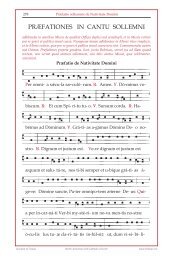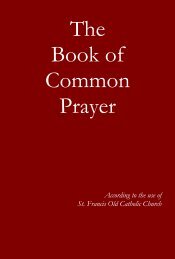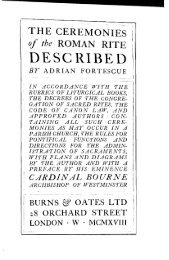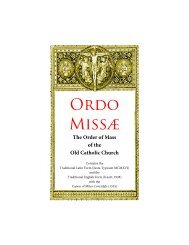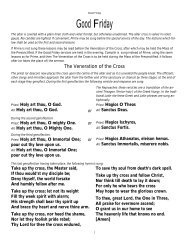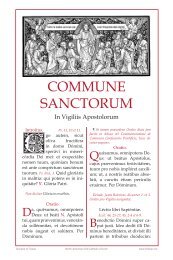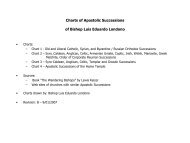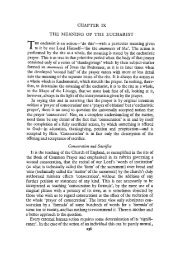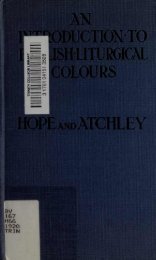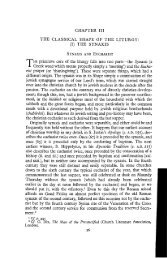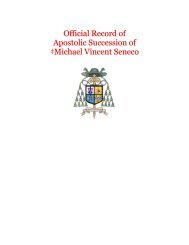Eucharist and Lord's Supper
Eucharist and Lord's Supper
Eucharist and Lord's Supper
Create successful ePaper yourself
Turn your PDF publications into a flip-book with our unique Google optimized e-Paper software.
THE SHAPE OF THE LITURGY<br />
significanceof the phrase 'the New Covenant in My Blood' in connection<br />
with the second paragraph of the berahah alX"clt the Old Covenant, which<br />
was rewritten in terms of the new christian meaning to form the christian<br />
eucharistic prayer. In the circumstances, the disappearance of these two<br />
all-important items from the christian chabUrah meal would be a quite<br />
sufficient differentiation between the two somewhat similar rites of the<br />
agape <strong>and</strong> the eucharist for jewish christians, but probably not for gentile<br />
converts from paganism. This, as well as the care <strong>and</strong> delicacy with which<br />
the separation was made, needs to be taken into account in considering by<br />
whom <strong>and</strong> when the 'four-action shape' of the eucharist was organised, a<br />
point which remains to be discussed.<br />
The Separation of the <strong>Eucharist</strong>from the Agape<br />
At first sight S. Paul's evidence in I Cor. xi. appears to be decisive that<br />
the eucharist <strong>and</strong> agape were still combined in a single observance when<br />
that epistle was written. But upon closer inspection this interpretation,<br />
though still, I think, the most probable, becomes less certain than is<br />
generally supposed. The difficultyis partly due to the difficulty of deciding<br />
how far S. Paul's use of quasi-technical terms is already in line with that<br />
which became normal in the second century; <strong>and</strong> partly to the tantalisingly<br />
obscure way in which he refers to the actual practices at Corinth to which<br />
he is objecting, which he <strong>and</strong> his correspondents could take for granted,<br />
but which are by no means easy for us to make out.<br />
S. Paul has just been rebuking the Corinthian peculiarity of allowing<br />
women to pray unveiled <strong>and</strong> concluded that 'we have no such custom, nor<br />
have the churches of God', as a decisive reason against it (v. 16). 'With this<br />
watchword' he continues 'I praise you not that you hold your liturgical<br />
assemblies not for the better but for the worse.' His converts, to whom he<br />
had taught the rite of the New Covenant, have evidently made some change<br />
in their method of celebrating it, which they thought to be an improvement,<br />
but to which he takes serious objection. But, 'First, when you hold your<br />
assembly in the ecclesia, I hear there are quarrels among you, <strong>and</strong> I partly<br />
believe it' (v. 18). Having dealt with this, he comes to the main point.<br />
'Therefore when you assemble as the ecclesia it is not to eat the <strong>Lord's</strong><br />
supper, for each one greedily starts on his own supper at the meal, <strong>and</strong> one<br />
goes hungry <strong>and</strong> another gets tipsy'. Having regard to the fact that the<br />
'<strong>Lord's</strong> supper' in the second century means the agape apart from the<br />
eucharist proper, <strong>and</strong> that the first phrase can perfectly well mean 'When<br />
you assemble as the ecclesia it is not possible to eat the <strong>Lord's</strong> supper', it<br />
would be legitimate to underst<strong>and</strong> this as meaning that the ecclesia is not<br />
the right sort of occasion at all for celebrating the agape, but only for the<br />
eucharist; i.e. the two rites have already been separated <strong>and</strong> the innovation<br />
of the Corinthians consisted precisely in combining them again. Such an



